If you run an online store or you simply enjoy online shopping, it is very likely that you have heard of Aliexpress. The exceptionally wide product range and low prices have made this Chinese online shopping platform a go-to destination for users from around the world. For them, the platform’s advantages far outweigh its drawbacks, such as the inconvenience of long shipping times.
Unfortunately, the platform’s popularity is also eagerly exploited by manufacturers of counterfeit products, which causes problems to both buyers and legal sellers.
In order to restrain these widespread infringements, the executives at Aliexpress (Alibaba Group) have set up a dedicated IPP platform through which IPR holders can report rogue traders.
If you would like to take advantage of this opportunity, but you are unsure how this reporting is done, this article will make things clear for you.
Let’s start by summing up
Don’t want to read the entire article? Take a look at the overview provided below:
- Thanks to the free-of-charge IPP platform, IPR holders can submit notifications about infringements of their rights on platforms belonging to Alibaba Group (including Aliexpress).
- Here are the steps to be taken by the user:
- creation of an account and completion of data;
- adding the rights of the IPR holder to the platform;
- submission of a complaint.
- This notification process often requires the IPR holder to upload the necessary documents to the platform in the form of electronic files (for example, documents confirming the identity of the complainant or the existence of an IPR, as well as documents confirming the infringement).
Depending on the gravity of the infringement, rogue sellers may face various sanctions (for example, a ban on participating in promotional campaigns or even a removal of the account from the platform).
What is Alibaba’s IPP platform?
The IPP platform is intended to enable its users to pursue all intellectual property infringement cases using a single account.
Its key functionalities include, in particular, the ability to register IPRs by their owners (for example, trademarks) as well as notification and handling of complaints. Importantly, complaints do not have to relate to IPRs which are subject to registration (e.g. trademarks or patents), but also to unregistered rights (e.g. copyrights to works which do not become registered in Poland).
Reporting infringements of intellectual property rights on Aliexpress
Complaints may relate to infringements identified on platforms belonging to Alibaba Group, namely:
- Taobao.com;
- Tmall.com;
- Tmall.hk;
- 1688.com;
- Alibaba.com;
- AliExpress.com.
If the complaint is accepted, the listing of the product which violates IPRs will be removed, and the seller will bear the consequences described below. However, sellers are not entirely defenceless, as they can provide responses to the submitted complaints. Therefore, the IPR holders should verify their claims thoroughly before using the IPP platform. Although the site allows both parties to have their say, it was created to serve the genuine victims of IPR infringements.
What are the advantages of AliExpress’ infringement reporting platform?
Despite the fact that the IPP platform is unable to replace conventional legal proceedings in the battle against infringements, it certainly has some useful advantages. First of all, it makes it possible to put a stop to existing infringements (at least on platforms belonging to Alibaba Group) where it is virtually impossible to „get hold” of the infringer through legal means (because of costs or geographical location). Moreover, the platform is free of charge and exceptionally user-friendly.
It is worth noting that Alibaba Group makes it possible to report infringements of intellectual property rights also outside the IPP platform. This reporting can be done, in particular, by ordinary Aliexpress users, who can use the buttons located next to each product and a special complaint tab in their account. It is also possible to email the description of the infringement and the proof needed to the email address provided. However, according to the information published by Alibaba, the IPP platform ensures the fastest and the most efficient handling of complaints.
Creating an AliExpress account – IPP
Using the IPP platform is only possible after creating a user account.
To do so, visit the platform (located at this address: https://ipp.alibabagroup.com/index.htm) and click the „Register” tab. The next stage requires you to complete a simple form with the following data:
- country (you can select „Mainland China” [„China”] or „Others” [„other country”]) from the drop-down list;
- user type (you can choose between „Individual” [„natural person”] and „Enterprise”);
- user status (you can choose between „Right holder” and „Authorised agent” of such person);
- email address;
- the account password you have created and its confirmation.
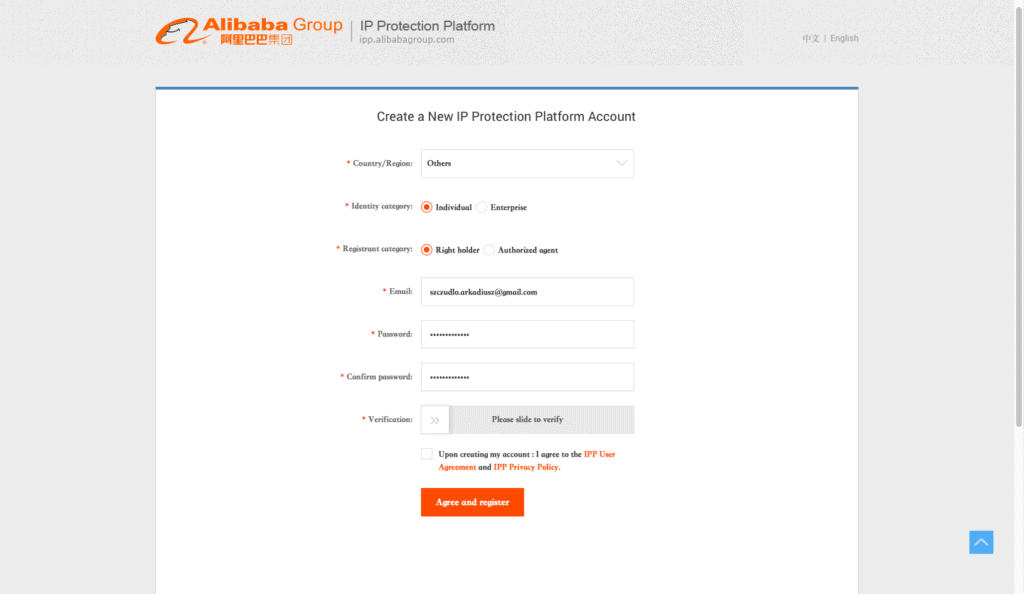
6. Having dealt with bot protection, ticking the checkbox next to the statement of consent related to the agreement with the platform’s operator and the privacy policy, and clicking the Register button, a 6-digit verification code will be sent to the email address provided, which should then be entered in the field displayed.
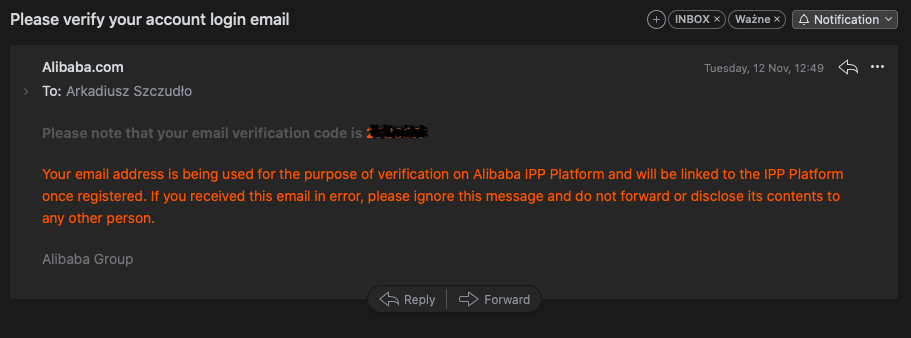
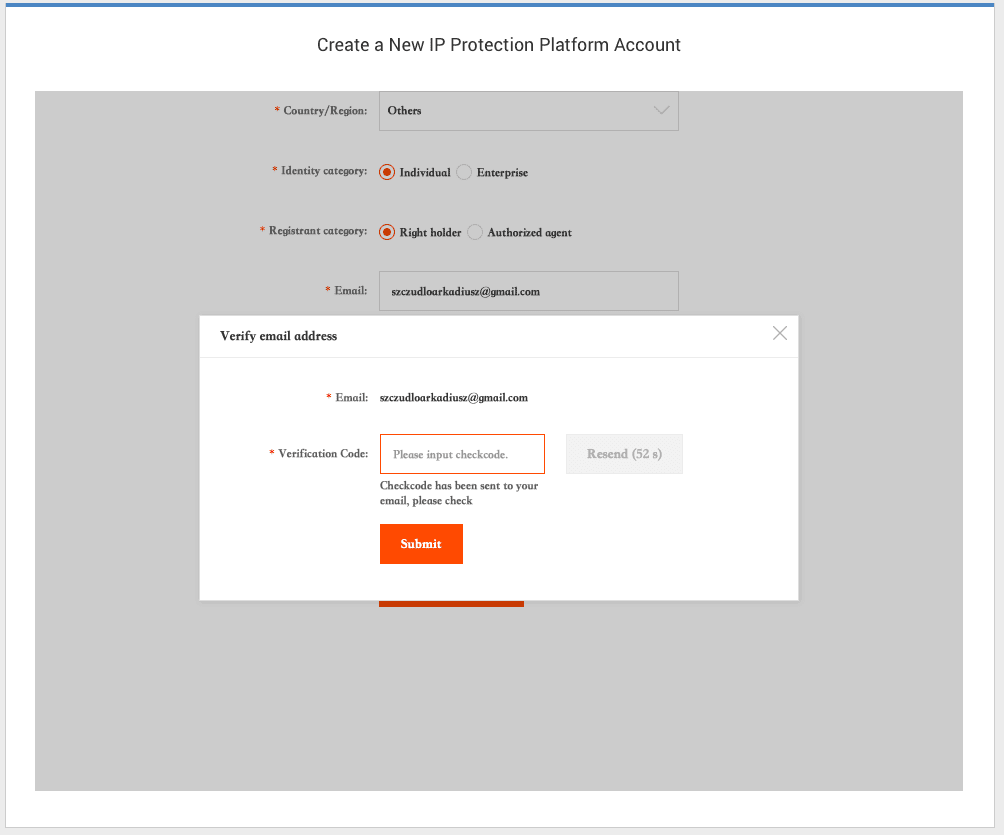
7. After the code is confirmed, it is possible to log into the platform using the login (email address) and the created password. Once you log in, the platform will look as follows:
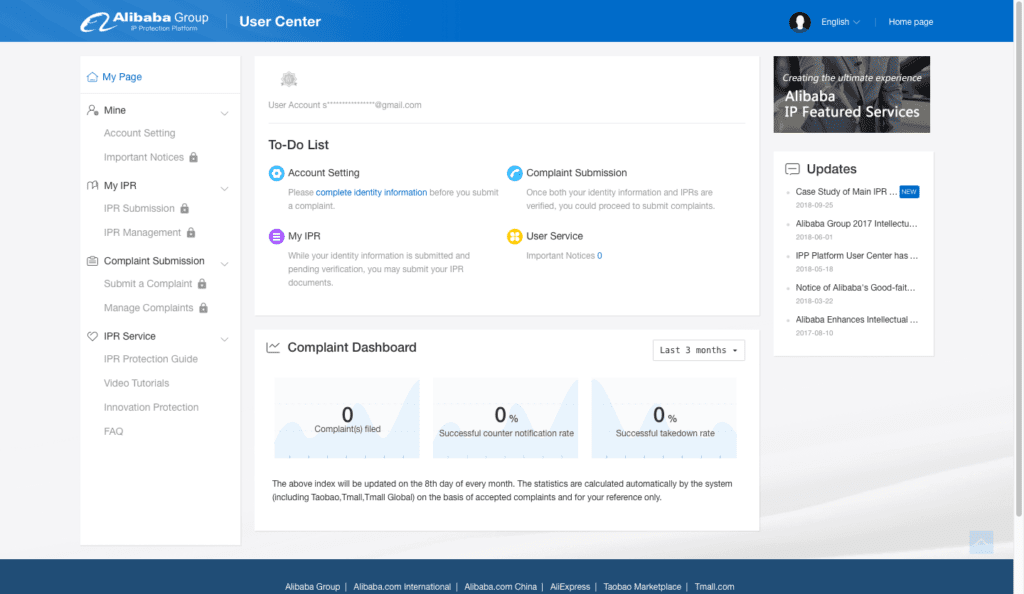
Completing data on the IPP account
Before using the IPP platform, you are required to complete your data.
If you are a natural person, you should:
- send a photo of a document confirming your identity (for example, an ID card, driving licence, passport). The allowed photo formats are .jpg, .jpeg, .bmp and .png., and the uploaded file must not be larger than 8 MB;
- provide:
- ID card number;
- first name (names) and surname;
- full postal address (street, number of the house/premises, post code, town/city, country).
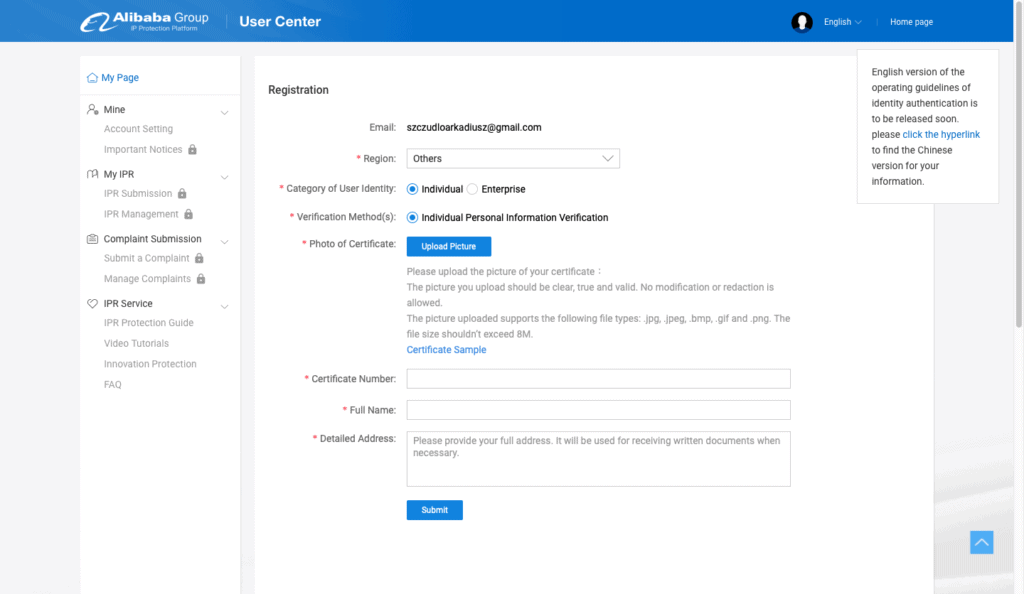
If you are an entrepreneur or a representative of a company, you should:
- upload a photo of a business registration certification to the platform (this may be a photo of a downloaded extract from the CEIDG or KRS system or .pdf files downloaded from these portals and converted to one of the supported file formats);
- provide:
- number of the business registration certification (in the case of companies this should be the KRS number, and for sole proprietorships – the NIP number);
- corporate name;
- expiration date of the business registration certification (select the „Permanent” option, as from a formal point of view, KRS and CEIDG extracts do not have an „expiry date”).
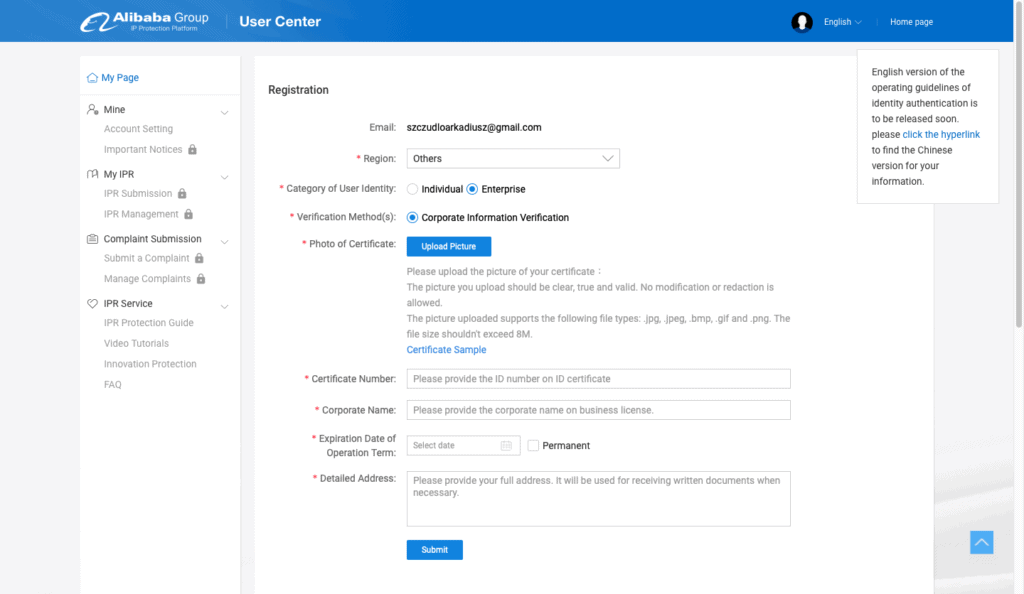
Adding your „rights” to the IPP platform
After completing the data, the next step is to add the IP rights you wish to protect via the platform. For this purpose, enter the „IPR SUBMISSION” tab and:
- select the type of IPR from the following options:
- „Trademark” – this includes registered trademarks;
- „Copyright” – covers copyrighted items, i.e. works (they are not subject to registration in Poland);
- „Patent” – covers items under patent protection, i.e. inventions;
- „Others” – this includes other categories of intellectual property rights, such as industrial designs;
- select the country (you can select „Others” [„another country”] from the drop-down list).
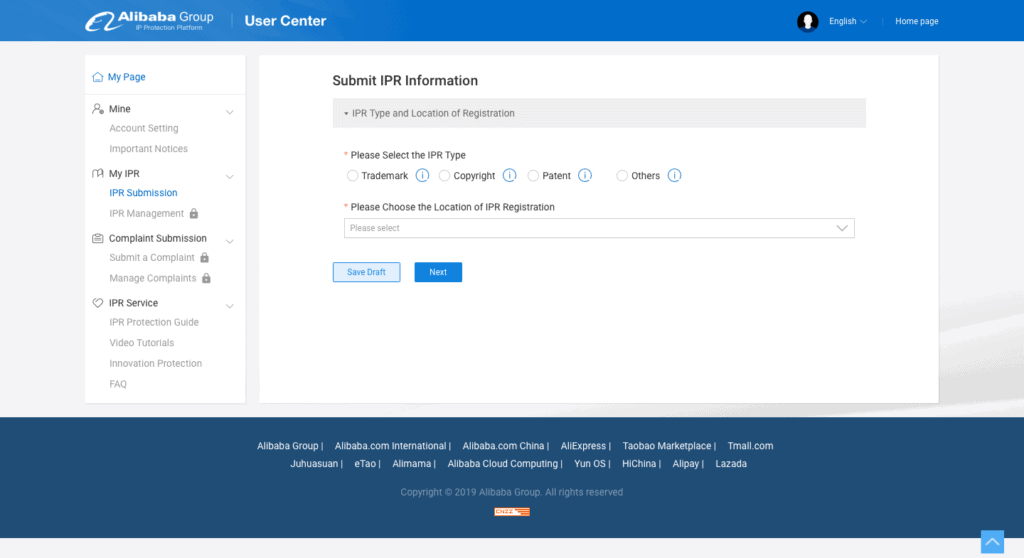
Jeżeli wybrałeś wariant “Copyright”, powinieneś w dalszej kolejności:
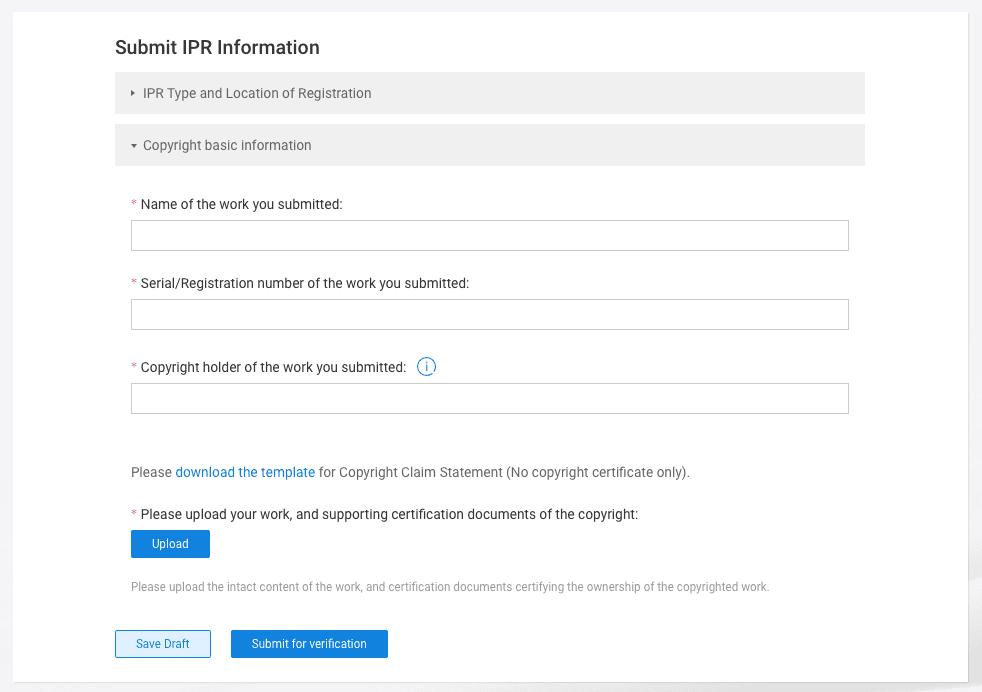
Claiming trademark rights in Aliexpress
If you have chosen the „Trademark” option, you should:
- upload to the platform:
- a file containing a document confirming trademark registration (in Poland – protection certificate). The allowed file formats are gif, jpg, .jpeg, .bmp, .png., .pdf. and .tsa, and the uploaded file must not be larger than 5 MB; Only one trademark can be submitted at a time (if you have more than one trademark, you must submit them individually);
- a separate file containing sections of the above document that relate to the classes of goods and services under which the trademark was registered;
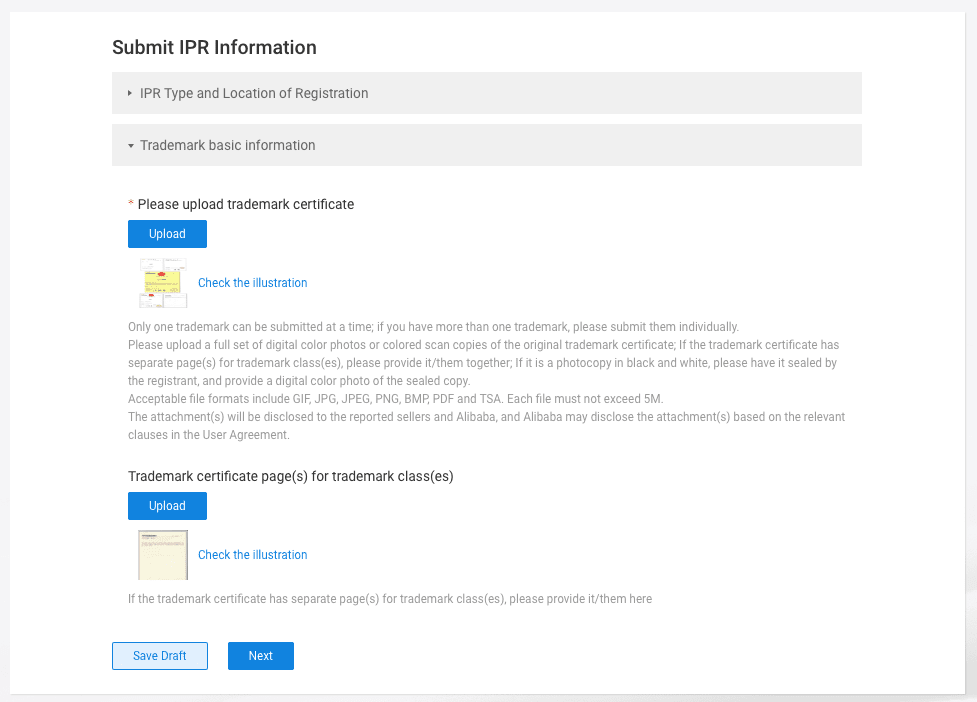
2. enter (in the next window):
- name of the trademark;
- registration number of the trademark (in Poland – exclusive right number);
- name of the trademark registrant;
- expiration date of the exclusive right;
- classes of the product or service under which they were registered;
- name of the brand connected to the trademark (select „Other” if you are unable to find it in the drop-down list);
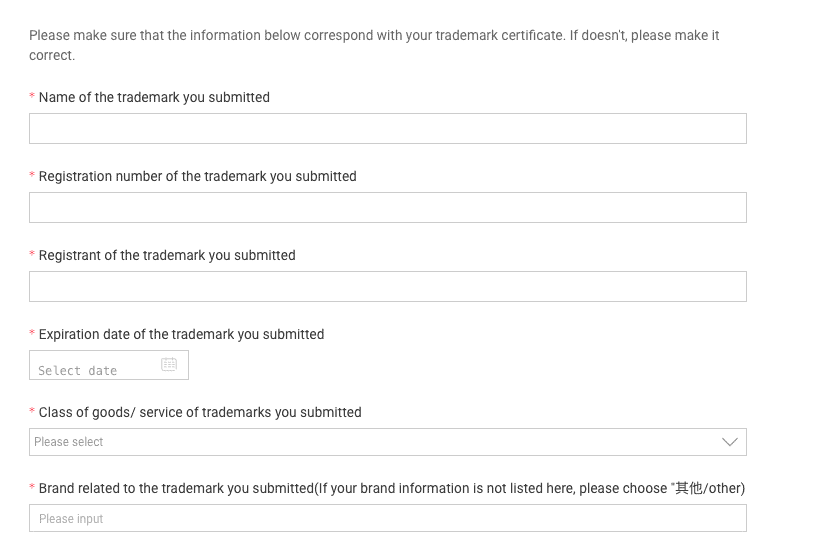
3. answer the questions (either YES or NO):
- has the trademark been renewed? (in Poland, the right of protection can be extended by 10-year periods);
- has the trademark been assigned before? (have you previously added this trademark to the platform?)
- has this trademark been previously notified to the platform?
- has it been altered? (have you rebranded?);
If the answer is YES, you need to upload a document confirming the above.
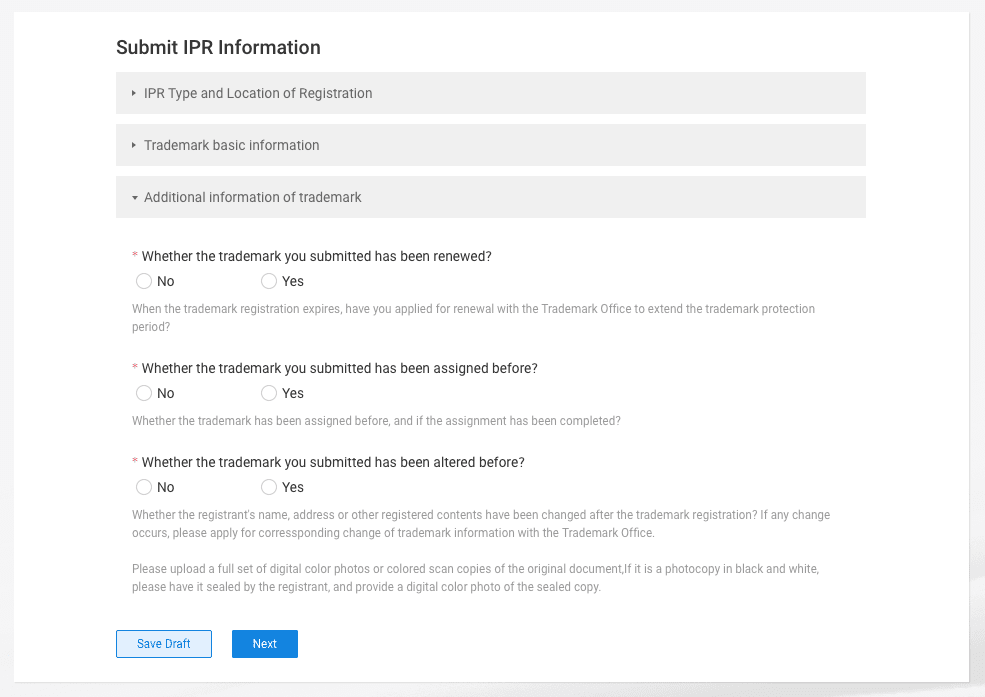
If you act under the power of attorney as a representative of the trademark holder (entrepreneur or company), the last step requires you to upload:
- a document confirming your identity;
- the number of such document;
- a signed scan of the power of attorney carrying a company stamp, which must first be downloaded from the platform (generated automatically on the basis of the information provided previously).
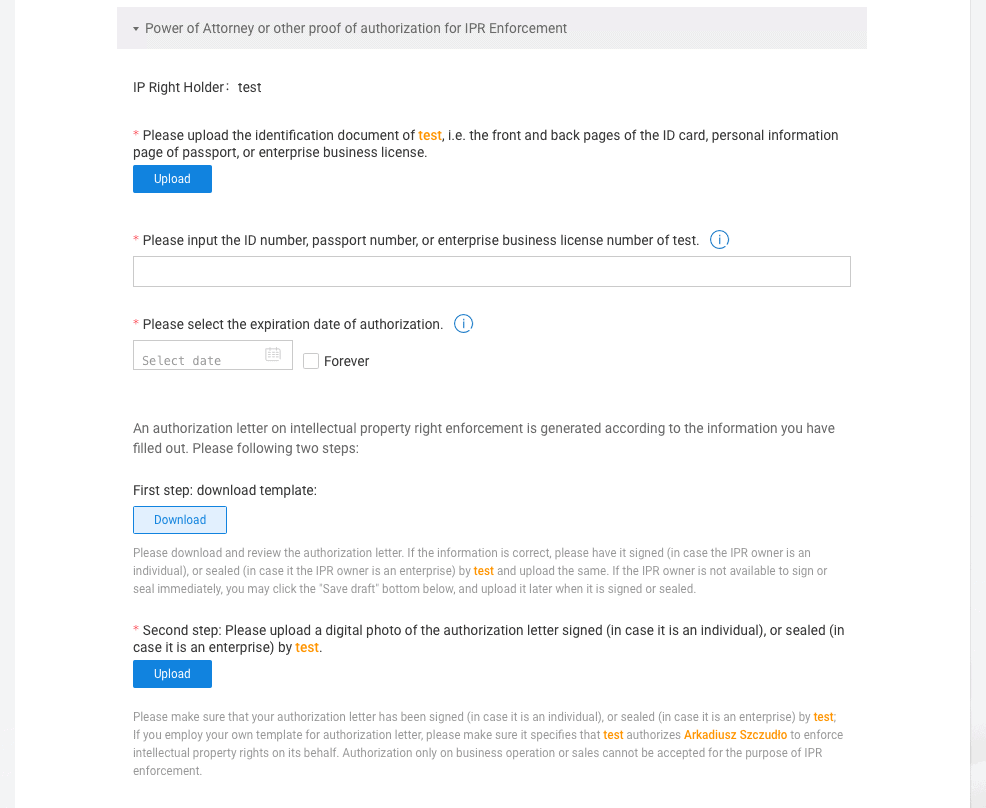
Claiming patent rights
If you have chosen the „Patent” option, the procedure of claiming patent rights is similar to that of submitting trademark rights („Trademark”).
What next?
Having completed the entire procedure, you can check the status of the reported rights in the dedicated tab („IPR Manage”). If your complaint is rejected, you will be sent an email listing the elements which still need to be provided, together with a link to a panel where you can add them.
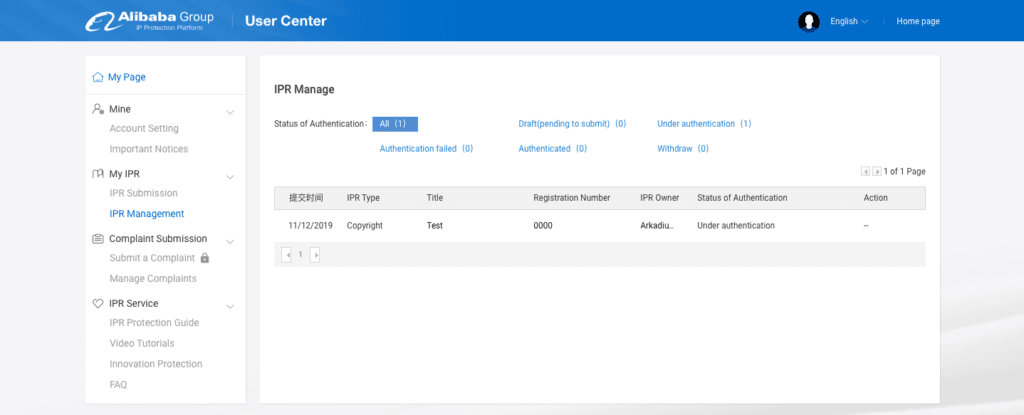
Submitting complaints and notifying infringements on the Aliexpress platform – IPP
Once the submitted IP right is approved, you will be able to proceed to filing a complaint relating to its breach. To do this, first click the „Submit a Complaint” tab, and then choose one of the Alibaba Group platforms, where the infringement is taking place. The next step is to provide the following information:
- the type and number of the specific IP right approved on the platform to which the infringement relates;
- links to the infringing products/websites;
- description of the infringement;
- evidence of the infringement (screenshots/photos enabling the infringement to be confirmed, for example, a combination of photos showing original and counterfeit products).
The complaint should be as detailed as possible, with precise identification of the specific elements constituting the infringement (for instance, identical details of the original and counterfeit products). This will speed up the processing of the complaint and the removal of the infringing listing from the platform.
What are the consequences for the infringer?
In addition to having a listing infringing the IP rights of another entity removed from the platform, rouge sellers may also incur other consequences, as described in Alibaba’s terms and conditions. Their severity depends on two factors:
- the type of law violated;
- the gravity of the infringement (classed as „serious” or „general”).
According to the information provided on Alibaba websites, including in their terms and conditions, „general” violations (which include minor, non-serious violations) are subject to penalty points added to the seller’s account, which are valid for a period of one year. The more points accumulated, the more serious the penalties (for example, the removal of the seller’s listings from search results, inability to participate in promotional campaigns).
If the seller collects 48 points, the seller’s account is removed from the platform. The seller, however, retains the right to answer the claims included on the complaint, and if this is response is successful, no points are handed out.
Sellers also benefit from some specific guidelines of calculating the penalty points – for example, the first complaint does not incur any penalty points, and several complaints based on the same intellectual property right may be treated as one complaint. The aim is to balance the interests of both parties and prevent the abuse of the complaint procedure aimed at eliminating one’s competitors.
If a seller commits a „serious” infringement (which includes obvious cases, such as the distribution of pirated copies of products or the use of someone else’s trademark), the seller does not receive points, but the infringement is „recorded” in their account and sanctions are imposed. The seller’s account is terminated if three such strikes are recorded.
Moreover, the terms and conditions provide for extreme cases (e.g. proceedings instituted against the platform, the seller being prosecuted by state authorities), which entitle Alibaba Group to delete such account immediately.
Conclusion
I hope this article will help you protect your intellectual property rights with the use of the IPP platform. If you do not have the means to pursue a lawsuit against a foreign infringer (in the case of countries from outside of Europe, practically only global corporations can afford to do that), this is the only way to effectively stop the infringement of your intellectual property rights. As the IPP portal is free-of-charge and relatively uncomplicated, your chances of submitting a complaint unaided are quite considerable. Most importantly, always keep your hand on the pulse and as soon as you determine (independently or having been notified by your clients) that someone is counterfeiting your products on Aliexpress – react immediately!







